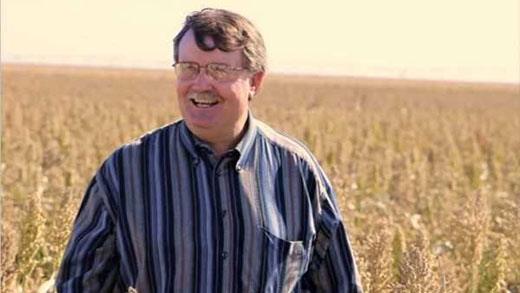
Earl Roemer, founder and president of Nu Life Market in Scott City, Kansas, produces and markets sorghum-based products and ingredients. | Download this photo
Kansas Profile -- Now That's Rural: Earl Roemer, Nu Life Market
June 28, 2017
By Ron Wilson, director of the Huck Boyd National Institute for Rural Development at Kansas State University
Food is necessary for life. For those with food allergies, the right kind of food is vital. When someone with gluten intolerance or another food allergy finds a tasty food which is healthy for them, it can be like a new lease on life. Today we’ll meet a Kansas entrepreneur whose company is helping supply those needs with a Farm to Family food safety program.
Earl Roemer is founder and president of Nu Life Market in Scott City. Nu Life Market business development manager Rachel Klataske shared his story with me.
Earl’s family has farmed in the High Plains of Kansas for four generations. As do many western Kansas farmers, his family grew grain sorghum – also called milo - as a feed grain crop for livestock.
Earl became intrigued by grain sorghum’s potential as a human food source. “Earl is a scientist by training and a farmer by background,” Rachel said.
He started researching the potential use of grain sorghum as a human food crop. According to one account, the early grain sorghum products “tasted like cardboard and the texture was like sand.” Now they are much improved. K-State food science professor Dr. Fadi Aramouni helped with research which significantly improved the quality and appeal of the product. K-State researchers even developed an award-winning recipe based on sorghum flour.
In 2007, Earl founded his own business to produce and market sorghum-based products and sell sorghum ingredients to other food companies. The company was named Nu Life Market. Facilities were built in Scott City to accommodate the careful processing which allergen-free products require.
With the increased interest in gluten-free products such as sorghum flour, the demand for Nu Life Market products has grown significantly as has the company’s workforce. For example, Rachel Klataske studied bakery science at K-State and was a product developer for Post cereals in Michigan before coming back to Kansas. She is now business development manager for Nu Life Market and her husband Ryan Klataske is a cultural anthropologist who has taught at K-State.
Sorghum is an ancient grain. Traces of it have been found from 8,000 years ago in Egypt. In recent years, it has been grown in the U.S. as a water-conserving alternative to corn. Kansas is dominant in sorghum production. An estimated 52 percent of U.S. sorghum production comes from Kansas alone.
The gluten-free and other properties of sorghum flour, such as its non-GMO status, now make it especially popular as a human food ingredient. “Some sorghum varieties are even higher in antioxidants than blueberries,” Rachel said.
The Nu Life Market processing facility was carefully designed and constructed in Scott City. “No allergen-containing grain comes into the facility,” Rachel said. The facility is dairy-, peanut-, and soy-free. As mentioned, Nu Life Market implemented a Farm to Family food safety program. This includes strict selection of fields, careful cleaning of equipment to prevent cross-contamination, processing in its dedicated facility, certification by the Gluten Free Certification Organization, and accredited third-party testing of the finished products. The flours are milled into a silky, fine particle size which is ideal for gluten-free baking. Packaging is designed to extend the product’s shelf life.
“Demand for our products is growing very fast,” Rachel said. Sorghum can be found in more than a thousand products, such as gluten free baked goods, cereal bars and snacks, represented by some 80 brands. Nu Life Market is shipping its products coast to coast and beyond.
“Since production of this grain uses less water, we are helping the environment and helping people’s lives,” Rachel said.
That is an impressive contribution by this company, created by a family which still farms at the nearby rural community of Healy, population 387 people. Now, that’s rural.
For more information, see www.nulifemarket.com.
When people with food allergies find good foods which are healthy for them, it is like a new lease on life. We commend Earl Roemer, Rachel Klataske, and all those involved with Nu Life Market for making a difference in people’s lives. They are responding to a new market for producers and providing good new products to consumers – from farm to family.
Audio and text files of Kansas Profiles are available at http://www.kansasprofile.com. For more information about the Huck Boyd Institute, interested persons can visit http://www.huckboydinstitute.org.
------------------------------------------------
The mission of the Huck Boyd National Institute for Rural Development is to enhance rural development by helping rural people help themselves. The Kansas Profile radio series and columns are produced with assistance from the K-State Research and Extension Department of Communications News Media Services unit. A photo of Ron Wilson is available at http://www.ksre.ksu.edu/news/sty/RonWilson.htm. Audio and text files of Kansas Profiles are available at http://www.kansasprofile.com. For more information about the Huck Boyd Institute, interested persons can visit http://www.huckboydinstitute.org.

